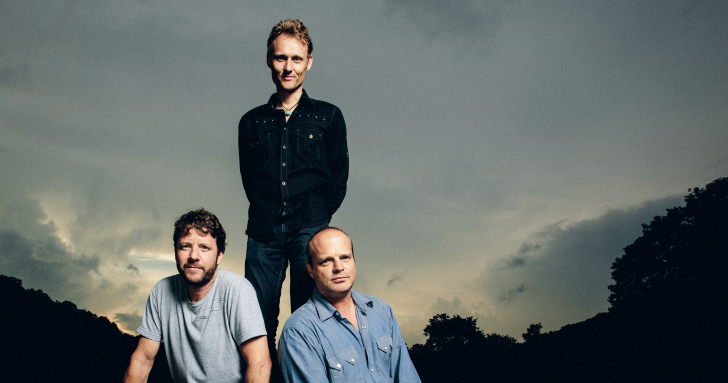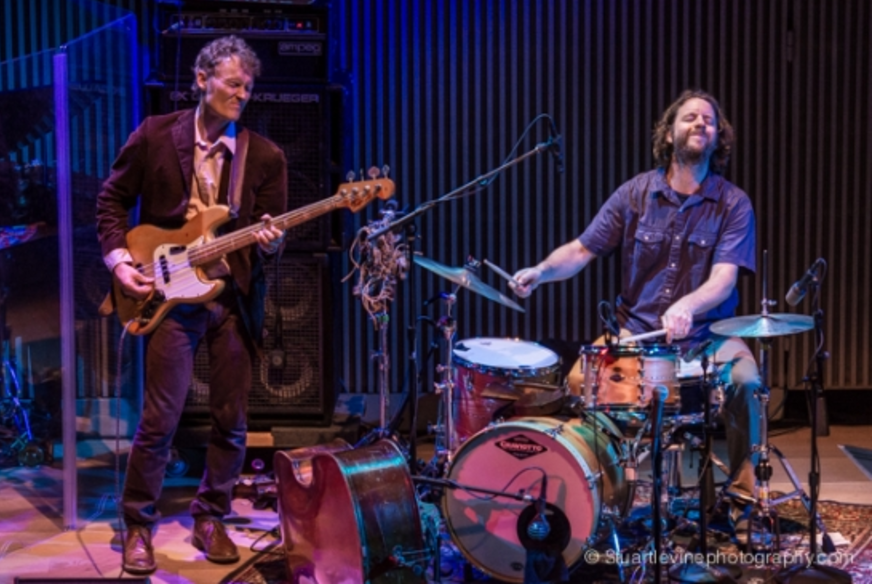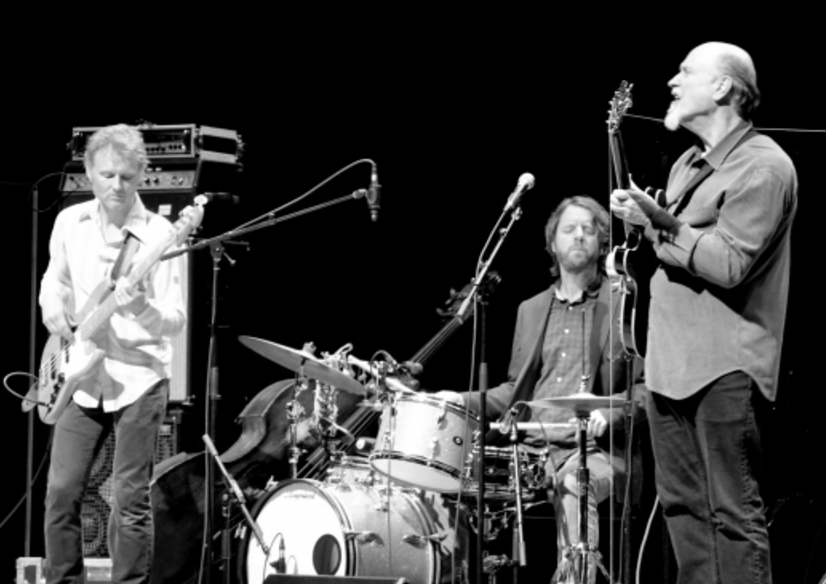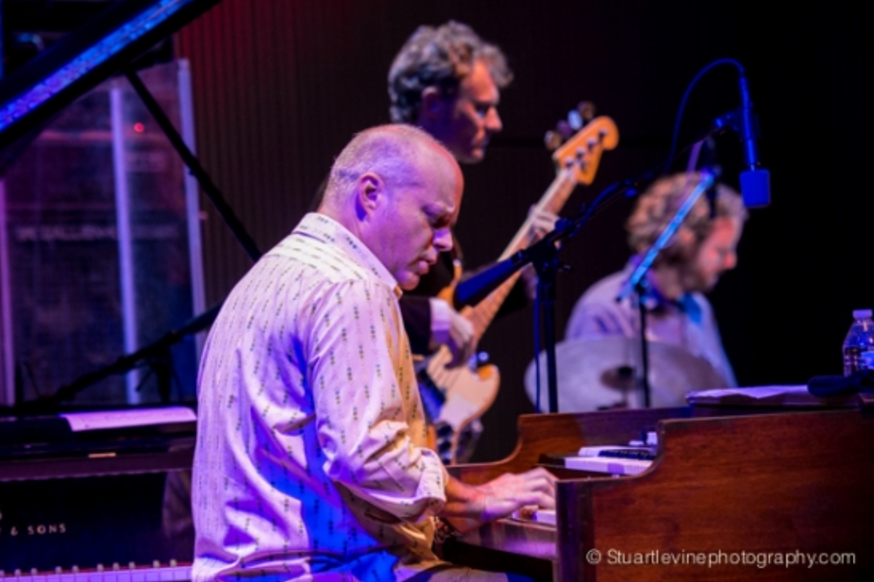Medeski Martin & Wood: The Triple Entente

Billy Martin is feeling nostalgic. Medeski Martin & Wood have just finished a blistering first set at the tiny West Village club (Le) Poisson Rouge, where the trio has been hunkered down for two nights to celebrate their 25th anniversary. After introducing his partners in crime, John Medeski and Chris Wood—as he has done diligently at every show over the last two-plus decades—Martin mentions how significant the space that they are standing in is to them.
“We started right here, on this block, at the Village Gate— right upstairs,” he tells the crowd. “Unfortunately, now it’s a CVS. But this downstairs was part of the Village Gate, and it was our very first gig together. So thank you so much for coming full circle with us.” Two weeks later, Martin is showing me around his property in northern New Jersey. Nestled in a suburb that looks like a lot of Northeastern towns, his home is weathered brick that is somehow still standing, even after years of harsh winter beat downs. The premises are also something of a rare find for Jersey. The backyard is deep, giving Martin the land to construct different spaces for his different frames of mind.
At the very back is a small Japanese-style teahouse he built by refurbishing a shed that was already on the land when he bought it. It’s a furniture-less space where he comes to find solace, with books like Patti Smith’s Just Kids and vinyl records adorning the floor.
“I’ve slept out here many nights,” he informs me.
His home studio, which resembles a little wooden house that would feel right at home in The Hobbit, is also in his backyard. It’s where he records and teaches. Inside, there’s a faint smell of patchouli lingering and more books, CDs, stacks of hard drives and computers to provide on-the-spot mixes. And, of course, there’s a killer-looking drum set.
After catching up a bit about the band’s early days in the Downtown New York City jazz scene and discussing how MMW found a bigger audience after their music was blasted over the PA at many mid-‘90s Phish shows, the conversation turns to the band’s recent output—or lack thereof. It’s not like they broke up or anything, but the days of MMW as road warriors have become a thing of the past. Their last reordings as a trio came in 2011—a 20th anniversary set of new songs simply called 20. The group’s segue from a full-time touring and recording project to an unofficial hiatus period was a slow fade without a major announcement, leading many of the band’s fans to wonder what was happening behind the scenes.
“I was whining and complaining that I don’t wanna be on the road so much,” Martin says. “[I thought], ‘I don’t wanna burn out.’ I was the first one to bring these things up.”
These feelings started in the late 1990s, as the band’s club following was booming. Band meetings to discuss the slowdown started a few years later and, as Medeski puts it, the trio “definitely paused” as the last decade came to an end.
“One of the things that has kept us going all these years is that each of us has our own creative life outside the band, in addition to the band,” Medeski says. “We came together like that—three individuals with different backgrounds. The road gets weary, in any shape or form, but we never got tired of playing with each other. We’re not one of those bands who hated each other, just getting onstage and playing the same songs they did years ago to get a paycheck.”
Martin got married and started a family in 2000, when the trio was peaking in popularity. They released arguably their three strongest albums over a string of four years: 1996’s dark, funky dorm room breakthrough Shackman, 1998’s electronic-tinged Combustication and 2000’s The Dropper. After picking up a generation of listeners through Phish and the larger jamband scene, they purposefully conceived The Dropper as an album they thought would turn of both fair-weather party fans and their record label. Sonically, it was their most challenging to date, and the title is a direct allusion to the idea that Blue Note would drop them after hearing it. They also were touring nonstop, in both the United States and Europe. And the anxiety from being away from his wife and new baby got to Martin, often. 
“When I was home, I was home—24/7. It might be a month, it might be a couple of weeks, just of solid being home,” Martin says. “Winding down from the tour and dealing with being the dad again, and then being the guy on the road, I felt guilty—very guilty.”
“Billy was the first one to start a family and struggled with that,” Wood says. “He wanted to be home with the family, understandably. So I think that was really what was behind it. I was the youngest in the band, and I’m thinking, ‘Well, how am I gonna pay my bills?’ It was not entirely, but partly, the incentive to start The Wood Brothers. It was sort of a coincidence that around that time, Oliver [Wood, Chris’ brother] and I started reconnecting.”
MMW’s 25th anniversary shows were originally supposed to take place in October. The dates sold out in advance and some fans had even booked flights—and then Wood unexpectedly wound up in the hospital. He was out on tour with The Wood Brothers and, after a particularly rowdy gig in Augusta, Ga., he felt an unbearable pain in his stomach. It didn’t pass, and he had enough sense to get to a doctor, pronto. The original diagnosis was intestinal blockage, but it turned out to be much more serious than that. Scar tissue from an appendix operation Wood had undergone when he was 14 was growing in a way that was wreaking havoc on his insides.
“It’s not a complicated thing but, if you don’t deal with it, it cuts of all the blood flow and then your intestine dies, and then you die,” Wood says. He spent the next few weeks in the hospital, a rare moment during the last 10 years when he was forced to take a break from touring.
Right around the time MMW was looking to slow down, Wood shifted gears sonically and started playing with his brother Oliver— the two formed The Wood Brothers in 2004 after Oliver’s King Johnson project opened for MMW in North Carolina. Oliver sat in with the trio during their set, and the brothers realized they had a strong musical connection. When MMW would get of the road, he’d immediately go back out. Creatively, it was a big shift: He would jump from playing improv-heavy jazz and funk to Americana roots music overnight.
“There was a little crossover at first,” Wood says. “People were trying to associate MMW with The Wood Brothers but, of course, musically, it does not relate at all. It’s a completely different thing. So that fizzled out pretty quickly, and it was basically me and my brother in a minivan touring around, just building up fans and finding our voice as a very young band.”
Since then, The Wood Brothers have released six studio albums and spent countless years on the road, infiltrating the roots-music scene from coast to coast. A few years ago, Wood relocated his family from Upstate New York to Nashville to dedicate his time to The Wood Brothers fully and pick up session work as a bassist.
“If all we ever did was MMW all the time, it just becomes too insular,” he says. “You lose sight of what you’re doing and you might get tired of it. It’s always important to put yourself in a different context because you learn from everything.”
Both Martin and Medeski feel similarly about this and point to the early days of the band, when they would play with different projects constantly and bring those findings back to the group.
During the past several years, Medeski has been all over the place—both as a studio musician and in live settings— and cites his work with the composer and saxophonist John Zorn as particularly fruitful. He’s also kept busy performing alongside The Meters’ George Porter Jr. and Zigaboo Modeliste in Foundation of Funk, as well as with a pair of improv-friendly trios—Fire Jelly, featuring guitarist David Fiuczynski and Calvin Weston, and DRKWAV, which includes saxophonist Skerik and drummer Adam Deitch. Mad Skillet, his quartet with guitarist Will Bernard, recently recorded their debut, too.
If that wasn’t enough, this winter Medeski announced the formation of Hudson, a new supergroup consisting of drummer Jack DeJohnette, guitarist John Scofield and bassist Larry Grenadier. The Hudson River Valley neighbors spent time working on an album together and will tour throughout 2017. 
Medeski left New York City in 2003 and moved upstate to find solace in nature, something he says was lacking when he was living in the city.
“I live in the woods. It’s beautiful,” Medeski says. “And that’s where a lot of inspiration comes from.”
The keyboardist has been multitasking in his creative life for years now, prioritizing other groups over his own desires as a solo musician.
“All these projects and incredible opportunities make it hard for me to find time to focus on my own music,” he says. “How do I say no to any of this stuff? That challenge is along the same lines as touring—finding that balance between creating, being home and nurturing that, and being out playing amazing music with amazing people. Maybe it’s a problem—but I’m not complaining.”
There’s a third, unfinished structure on Martin’s property—a tall building that he’s lovingly calling “The Herman House,” named after his first drum teacher, Allen Herman. Martin, who learned carpentry as a teenager, is building it from scratch. It will be connected to his studio and serve as a multifaceted performance space. He envisions theater workshops, musical performances, film screenings and more taking place on his property. It will also be an aid to his teaching, and he’s already worked out a sponsorship with the Creative Music Foundation, a Woodstock, N.Y.-based nonprofit focused on music education, to get this of the ground.
Teaching has been one of the drummer’s primary focuses over the last decade but, even though he finds it rewarding and much more in line with his desired lifestyle, he admits that times have been tough in recent years.
“I’ve been on the brink of having to sell the house,” Martin says. “It’s been very stressful. We just cut costs as a family and it’s still hard. I don’t have any security other than my intellectual property and my integrity, and so the only thing that I know that I have is something to offer, which is education, new work and collaborations.”
When asked whether MMW would do a full-blown tour like the band did in the old days, he emphatically says no. But that doesn’t mean they don’t have plans going forward. There’s a live album that they recorded in 2015 with the Alarm Will Sound chamber orchestra that features new pieces by Medeski and Martin, as well as new spins on MMW tunes like “Uninvisible” and “End of the World Party.” They’re currently figuring out the best way to release it. 
There’s also a documentary about the band in the works and, if all goes well, they hope to reconvene at the fabled Shack recording studio in Hawaii, where they recorded Shack-man, to make a new record and film it for the documentary. Scheduling is tricky, of course, but all three members are game.
“The thing is, we have to rebuild the Shack,” Martin says of the prospect of returning to the site. “It’s completely almost melted into the jungle there.”
“I’d love to have another opportunity to make a record that way,” Medeski adds. “When I think about all of our individual projects, there’s something about the three of us—we keep each other in check in a lot of ways, musically and artistically. Whenever we get back together, there’s more to add. The common ground we find is pretty broad.”
Medeski also fantasizes about recording an album with the trio and their longtime guitar collaborator Marc Ribot one day.
Along with teaching and building The Herman House, Martin is writing a script for a movie that he hopes to make someday soon. It’s about a young drummer in the Lower East Side of New York City, learning to navigate life and music in the early ‘90s.
For now, MMW are content to play occasional gigs, with the knowledge that the three of them still retain the instant connection that they felt when they first got together 25 years ago and played at a West Village club that’s now a CVS.
“We love each other—but I have a new chapter in my life,” Martin says. “To have a creative life, whether it’s visual art, composing music, filmmaking, teaching—it’s a creative process for me. All these things are jobs that I can supplement my living with. And it just gives me more freedom to be home and work on these things.”



















